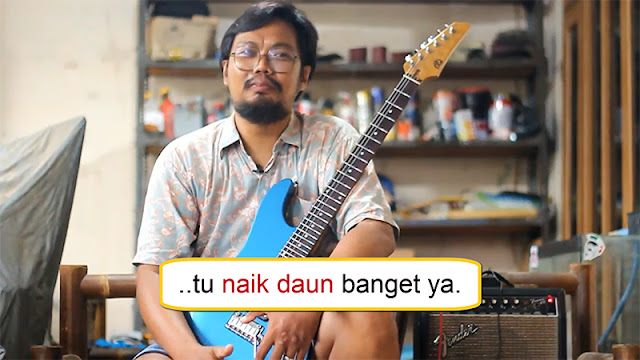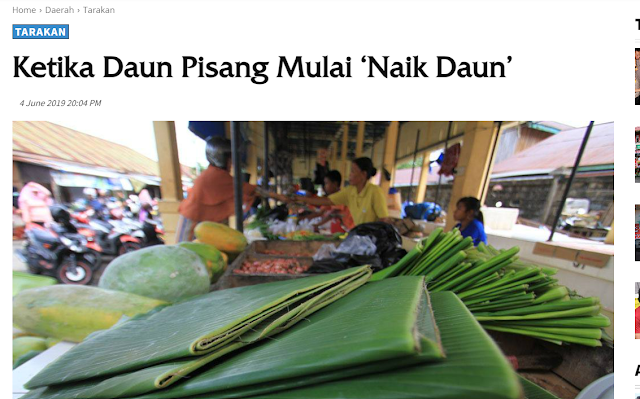- Get link
- X
- Other Apps
Posted by
Iman Prabawa
on
- Get link
- X
- Other Apps
Halo semuanya, ketemu lagi sama saya, Iman Prabawa. In this article, I want to talk to you about the meaning of the phrase [naik daun], and as always, we are also going to be looking at examples from movies, YouTube videos, comics, and whatnot where Indonesians use the phrase.
If you have any questions regarding the Indonesian language, you can ask me directly. You can see how to do that on my About Me page.
If you are a beginner in the Indonesian language, you can learn step by step with My Lesson Here.
So, let's dive right in.
Naik Daun In Indonesian
[Naik daun] if translated word for word, meaning riding the leaves. This meaning makes absolutely no sense. And this is not the real meaning of the phrase.
[Naik daun] means something or someone that is currently on the rise, rising in popularity, and widely known by a lot of people.
Example sentence:
1. Sedang naik daun, ini profil Raissa Anggiani, penyanyi "Kau Rumahku" yang diapresiasi Ahmad Dhani. (Currently on the rise, this is the profile of Raissa Anggiani, singer of "Kau Rumahku", which Ahmad Dhani appreciates.)
2. Ketika daun pisang mulai naik daun. (When banana leaves start to rise.)
How to Pronounce Naik Daun
Here is how you pronounce [naik daun] in bahasa Indonesia.
Moving on, let's look at examples where Indonesians use the phrase [naik daun].
Examples of Naik Daun In Use
The first example we are about to watch is taken from Monstadz Guitar's YouTube Channel. Let's watch the clip below.
Below is what he says in the short clip above with English translations.
Jadi, sejak pandemi kemaren, merek gitar dari Ambarawa ini tu naik daun banget ya. Kalo kita lihat di sosial media seperti Instagram followers Instagramnya itu banyak banget ya. (So, since yesterday's pandemic, this guitar brand from Ambarawa has become popular. If we look at their social media, like Instagram, they have a lot of followers.)
So, [naik daun] in this context is rising in popularity. This guitar brand has become popular and started to be used by a lot of guitar players.
Vocabulary From the Clip
[Jadi] = so.
[Sejak] = since.
[Tu] is a common reduction for [itu] = that. For more about this, you can read my article here: Itu, Tu, and Tuh In Indonesian.
[Ini] = this. For more about this, you can read my article here: Ini, Ni, and Nih In Indonesian.
[Banget] = [sekali] = very. For more about this, you can read my article here: Banget In Indonesian.
The second example is from Nex Carlos's YouTube channel. Let's look at the clip below.
Below is the conversation from the clip above with English translations.
Nex Carlos: Kak Salma dari Aceh? (You are from Aceh?)
Salma: Iya. (Yes.)
Nex Carlos: Acehnya di mana? (Where in Aceh?)
Salma: Aceh Pidie. (In Pidie.)
Nex Carlos: Pidie? Wah! Lagi naik daun tuh kayanya Pidie, ya? (Pidie? Wow! It's getting popular, Pidie, isn't it?)
Salma: Lagi naik daun ya, koh? (Oh, it's getting popular?)
Nex Carlos: Iya. Ini lagi banyak yang ini, ya? Lagi banyak yang mengungsi kayanya, ya? (Yup. There are a lot of people who have done that, right? A lot of people are going refuge there, I suppose?)
Salma: Rohingya. (The Rohingya refugees.)
Nex Carlos: Bener, ya? Di Pidie ya itu, ya? (Am I right? That is Pidie, right?)
Salma: Iya. (Yup.)
Nex Carlos: Wah. Saya ke Aceh udah pernah. Tapi belum pernah ke Pidie. (Wow. I have been to Aceh. But I've been to Pidie.)
Salma: Belum pernah ke Pidie? Main ya koh, ya? (Oh, you've never been to Pidie? You should go there sometimes.)
Nex Carlos: Cuma.. (But..)
Salma: Mau liat pengungsi Rohingya? (You want to see the Rohingya refugees?)
Nex Carlos: Oh, bukan. (Oh, no.)
In this clip, Nex Carlos is talking about Pidie, which is talked about by many people right now. So, [naik daun] here means getting talked about by many people or getting popular.
Vocabulary From the Clip
[Kak] is an honorific title to address older persons or females. For more about this, you can read my article here: Kakak In Indonesian.
[Dari] = from.
[Koh] means older brother. It's an honorific title to address someone for being polite. It's like [bang] and [mas].
[Tuh] is informal for [itu] = that. For more about this, you can read my article here: Itu, Tu, and Tuh In Indonesian.
[Udah] is a common reduction for [sudah] = already.
[Liat] is the conversation way of saying [lihat] = to see, to look.
[Bener[ is informal for [benar] = true.
Read also: PR In Indonesian
This wraps up today's article. If I find another example, Insha Allah, I will update this article again. Thank you, and I'll see you soon. Bye now.
- Get link
- X
- Other Apps
Hello, I'm Iman Prabawa a.k.a Pak Guru Iman. I love to share about languages. My Instagram, @iman_prabawa



Comments
Post a Comment